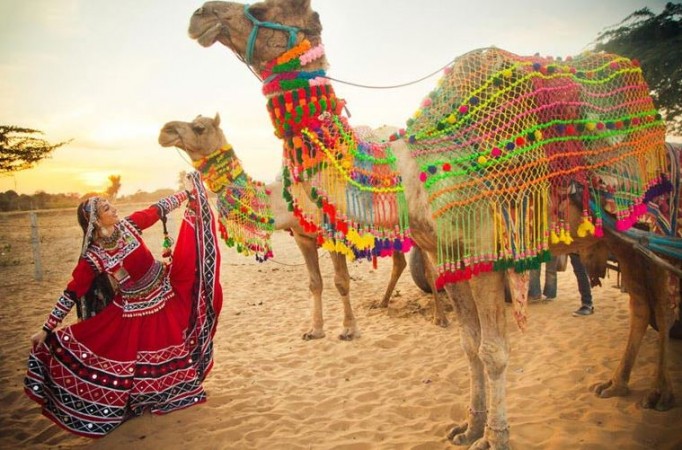
Rajasthan, the majestic land of forts, palaces, and vibrant traditions, is not only known for its architectural wonders but also for its delectable cuisine. The cuisine of Rajasthan reflects the rich cultural heritage and the arid environment of the region. The most delicious and extravagant cuisine comes from the land of scintillating sand and culturally rich and ancient heritage- "The Rajasthani Food". The extremes of the palate with some of the spiciest dishes on one spectrum and sweetest desserts on the other, Rajasthani food has it all. The cuisine is rich in spices having a strong flavor and rich texture. Rajasthan is known for its Royal Rajwaadi cuisine (also known as Raajsi cuisine) which emanated from the culinary traditions of Royal courts and temples. In this article, we will delve into the fascinating history of Rajasthan food and explore its cultural significance, uncovering the unique flavors, cooking techniques, and traditional dishes that have been passed down through generations.
Historical Influences on Rajasthan Cuisine
The history of Rajasthan has shaped its culinary traditions in significant ways. The region's cuisine has been influenced by various factors, including the availability of ingredients, trade routes, and the influence of Rajput and Marwari cultures. The desert climate and scarcity of water and fresh produce have led to the creation of unique cooking methods and preservation techniques. Rajasthani cuisine is the cuisine of the Rajasthan region in North West India. It was influenced by various factors like the warlike lifestyles of its inhabitants, the availability of ingredients in an arid region, and by Hindu temple traditions of sampradayas like Pushtimarg and Ramanandi. Food that could last for several days and could be eaten without heating was preferred. The scarcity of water and fresh green vegetables have all affected cooking.
Staple Ingredients and Cooking Techniques
The arid landscape of Rajasthan has influenced the choice of ingredients used in its cuisine. Millets, such as bajra and jowar, form staple grains due to their ability to withstand harsh climatic conditions. Other key ingredients include lentils, beans, dairy products, spices, and dried fruits. The cooking techniques focus on maximizing flavors and preserving food for extended periods, such as slow cooking, sun-drying, and pickling.
Rajasthani Thali: A Gastronomic Extravaganza
The Rajasthani thali, a traditional meal served on a large platter, is a symbol of the state's rich culinary heritage. It is a feast for the senses, offering a variety of dishes that showcase the diversity of flavors and textures. The thali typically includes dal baati churma, gatte ki sabzi, ker sangri, bajra roti, and an assortment of chutneys, pickles, and sweets.
Festivals and Food Rituals
Rajasthan's festivals and celebrations are incomplete without their distinctive culinary traditions. The state's festivals, such as Teej, Gangaur, and Diwali, are marked by the preparation of special dishes and sweets. Each festival has its unique food rituals, including the making of ghewar, malpua, and gujiya, which are deeply ingrained in the cultural fabric of Rajasthan.
Street Food Delights
Rajasthan is renowned for its vibrant street food culture, offering a plethora of savory and sweet delights. From the famous pyaaz kachori and mirchi bada of Jodhpur to the delectable mawa kachori of Jaipur, the streets of Rajasthan are a paradise for food enthusiasts. The street food not only tantalizes taste buds but also provides an insight into the local flavors and culinary craftsmanship.
Cultural Significance and Hospitality
Food holds immense cultural significance in Rajasthan and plays a pivotal role in hospitality and social gatherings. The tradition of offering a warm welcome to guests with a glass of refreshing chaas (buttermilk), followed by a lavish meal, is deeply rooted in Rajasthani culture. Food is seen as a means of fostering social connections, strengthening relationships, and showcasing the hospitality of the people.
Traditional Sweets and Desserts
Rajasthan boasts a wide array of traditional sweets and desserts that are integral to its culinary heritage. From the rich and decadent mawa-based sweets like ghevar and kalakand to the crispy and syrup-soaked jalebi and malpua, the desserts of Rajasthan offer a sweet finale to any meal and are also associated with religious and festive occasions.
Preservation of Culinary Traditions
Despite the evolving culinary landscape, Rajasthan has managed to preserve its traditional recipes and cooking methods. Efforts by organizations, local communities, and food enthusiasts have played a crucial role in documenting and promoting the culinary heritage of the state. Food festivals, culinary tours, and cooking workshops have also contributed to the preservation and promotion of Rajasthan's culinary traditions.
Rajasthan's food is a testament to the rich history, cultural diversity, and resilience of its people. The cuisine is a harmonious blend of flavors, ingredients, and cooking techniques that have evolved over centuries. From the royal kitchens of the past to the bustling streets of present-day Rajasthan, the culinary traditions continue to enthrall both locals and tourists alike. Exploring the food of Rajasthan is not only a gastronomic adventure but also a deep dive into the cultural tapestry of the region. So, immerse yourself in the vibrant flavors, indulge in the traditional dishes, and savor the culinary delights that Rajasthan has to offer.
If you are going to Rajasthan in August, then include these places in your list
Goods train derails in Rajasthan, Several trains cancelled; Details Inside
Exploring the Historic Marvels of Jodhpur: famous Places to Visit